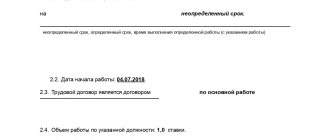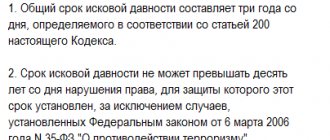Supreme Court on issues of calculating the statute of limitations for bringing to administrative liability
The Supreme Court of the Russian Federation in the Review of Judicial Practice dated July 17, 2019 provides an explanation of the ruling of the Supreme Court of the Russian Federation dated February 20, 2019 No. 305-AD18-18265 regarding the calculation of the statute of limitations for bringing to administrative responsibility for an offense, liability for which is provided for in Part 4 of Art. 15.25 Code of Administrative Offenses of the Russian Federation.
By resolution of the customs authority, the company was brought to administrative liability under Part 4 of Art. 15.25 of the Code of Administrative Offenses of the Russian Federation, for failure to fulfill, up to December 28, 2015 inclusive, the obligation to receive into their bank accounts funds due to the company for goods transferred to a non-resident under a supply agreement.
The company applied to the arbitration court to declare the decision of the customs authority illegal.
By the decision of the court of first instance, upheld by the decision of the appellate court, the company's application was satisfied. At the same time, the courts came to the conclusion that the established part 1 of Art. 4.5 of the Code of Administrative Offenses of the Russian Federation, the statute of limitations for bringing to administrative liability at the time the customs authority issued on December 29, 2021 the contested resolution to bring the company to administrative liability, provided for in Part 4 of Art. 15.25 Code of Administrative Offenses of the Russian Federation. The courts proceeded from the fact that the one-year statute of limitations for bringing to administrative responsibility was subject to calculation from December 29, 2015 from the day following the last day of the period provided for the fulfillment of the relevant obligation, and expired on December 28, 2016.
The district arbitration court overturned these judicial acts and sent the case for a new trial, since the specified period was subject to calculation from December 30, 2015 - from the day following the day the offense was committed.
Upon re-examination, the court of first instance came to the conclusion that the statute of limitations for prosecution had not expired by the time the customs authority issued the contested decision, and refused to satisfy the stated requirements of the company. The courts of appeal and cassation upheld the decision of the trial court without change.
The Judicial Collegium of the Supreme Court of the Russian Federation canceled the above-mentioned judicial acts and upheld the original decision of the trial court and the decision of the appellate court in connection with the following.
According to the provisions of Part 1 of Art. 4.5 of the Code of Administrative Offenses of the Russian Federation, as amended, in force during the disputed period, a resolution in a case of an administrative offense in the field of currency legislation of the Russian Federation cannot be made under
within one year from the date of commission of the administrative offense.
As follows from parts 1, 2 tbsp. 4.8 of the Code of Administrative Offenses of the Russian Federation, the periods provided for by the Code of Administrative Offenses of the Russian Federation are calculated in hours, days, days, months, years.
The duration of the period defined by the period begins on the next day after the calendar date or the occurrence of the event that determines the beginning of the period. The period, calculated in days, expires at 24 hours of the last day. A period calculated in months expires on the corresponding date of the last month, and if this month does not have a corresponding date, the period expires on the last day of that month. The term, calculated in years, expires in the corresponding month and date of the last year. By virtue of the note to Art. 4.8 of the Code of Administrative Offenses of the Russian Federation, its provisions do not apply if other articles of the Code of Administrative Offenses of the Russian Federation establish otherwise
the procedure for calculating terms, as well as when calculating terms of administrative penalties.
Thus, the provisions of Part 1 of Art. 4.8 of the Code of Administrative Offenses of the Russian Federation on the calculation of the period determined by the period from the next day after the calendar date or the occurrence of an event that determines the beginning of the period does not cancel the established part 1 of Art. 4.5 of the Code of Administrative Offenses of the Russian Federation, the procedure for calculating the period for making a decision in a case of an administrative offense from the day the administrative offense was committed.
According to the legal position set out in paragraph 14 of the Resolution of the Plenum of the Supreme Court of the Russian Federation dated March 24, 2005 No. 5 “On some issues that arise for the courts when applying the Code of the Russian Federation on Administrative Offences”, the statute of limitations for bringing to responsibility is calculated according to the general rules calculation of terms - from the day
following the day the administrative offense was committed (the day the offense was discovered). In the event of an administrative offense expressed in the form of inaction, the period for bringing to administrative responsibility is calculated from the day following the last day of the period provided for the fulfillment of the relevant obligation.
In the case under consideration, the courts found that the last day of the period provided to the company to fulfill the corresponding obligation to receive into its bank account the proceeds due for goods supplied to a non-resident was December 28, 2015.
Accordingly, the one-year period for bringing to administrative responsibility was subject to calculation from December 29, 2015 - from the day following the last day of the period provided for the fulfillment of the relevant obligation, and expired on December 28, 2016.
Thus, the contested resolution of the customs authority dated December 29, 2021 was issued after the expiration of the established part 1 of Art. 4.5 of the Code of Administrative Offenses of the Russian Federation, the one-year limitation period for bringing to administrative responsibility.
About violations in the field of traffic police
Traffic police fines are classified as administrative penalties. They must be paid no later than two months after the preparation of all official documents. The amount of the fine can be halved if payment is made within the first twenty days.
Info
The countdown for correcting the situation begins ten days after the violator has received the appropriate instructions.
The bailiff has the right to organize enforcement proceedings if the citizen does not take any steps to resolve the issue. Under such circumstances, the evader is given up to 5 days to voluntarily resolve the issue. Afterwards, the bailiffs begin to take a closer look at all the debtor’s property and his income.
If the amount of debt is 10 thousand rubles or more, then a temporary ban on traveling abroad is imposed.
When fines are imposed, the total period reaches 2 months. The period when we are talking about consideration of cases in court has been increased to 3 months. Citizens have from 10 to 60 days to appeal. Depending on whether the citizen communicates with the head of the traffic police, or comes to court.
How long does it take to pay a traffic fine?
Offenders are given exactly 60 days to fully pay the traffic fine. Together with 10 days to appeal the decision, the total period is 70 days.
If you do not meet the specified period and do not make payment, the fine will be considered overdue. There is nothing good for the driver in this situation, but we will return to this later.
How long does it take to serve a decree on the offending driver?
It is impossible to give exact dates. After all, a decision with a fine is a postal item that must still reach the place of registration of the addressee. And in this case, it is very difficult to predict the timing, since the third link is the Russian Post.
As soon as the resolution is ready, it is drawn up in the form of a registered letter and sent to the known address of the offender - the law allots 3 days for this (Part 2 of Article 29.11 of the Code). Further, everything depends on the speed of the Russian Post. In practice, “chain letters” can arrive 2-4 weeks after the decisions are made. Alas, neither the traffic police nor ordinary drivers can influence the delivery in any way.
The post office stores letters from the traffic police and courts for 7 days - is this true?
Yes its true!
The corresponding changes came into force on March 31, 2021 by Order of the Ministry of Digital Development of Russia No. 619. For comparison, previously the storage period for correspondence from the traffic police was 30 days. The drivers tried to stretch out the consideration of the case as long as possible, so they took the letters on the 29th-30th day of storage, and then appealed the fine on the 10th day. In 2021, letters from the traffic police and courts will take much less time to be delivered to recipients by post - only 7 days.
And if you do not pick up such a “chain letter” within the allotted time for storage, it will be returned to the sender - but the fine will come into force. There are far fewer loopholes for delaying deadlines.
Is it possible to pay with a discount?
Yes. Administrative fines in the field of traffic can be paid with a discount of 50% of the fine amount. This opportunity is provided by Part 1.3 of Art. 32.2 Code of Administrative Offenses of the Russian Federation. However, the same part provides a list of fines that are not subject to the discount. For example, for illegal parking on the lawn, drunk driving or repeatedly running a red light - for these and a number of other traffic violations, the driver will have to pay the fine in full.
A 50% discount on payment of a traffic police fine is available only within 20 days from the date of the decision on the violation. Yes Yes! The starting date is the day the decision was made by the IDPS or the court, and not the date of delivery of a copy of this decision to the violating person. And this is a minus for drivers!
But I received a copy of the resolution later than 20 days - will the discount expire?
Yes, the original benefit will expire.
But this does not mean that the driver will have to pay the full, rather than half, amount of the traffic police fine. No one has canceled equality before the law! This, in particular, was indicated by the Constitutional Court in Resolution No. 35-P of December 4, 2017, from whose submission changes were made to Art. 32.2 Code of Administrative Offenses of the Russian Federation.
Now part 1 of this article reads like this:
If a copy of the decision imposing an administrative fine, sent to a person held administratively liable by registered mail, was received at his address after the expiration of twenty days from the date of such decision, this period is subject to restoration by the judge, body, official, who made such a decision, at the request of a person brought to administrative responsibility.
What's important here? When a “chain letter” arrives to you late due to the fault of the postal service, as a result of which you missed the 20-day deadline for paying the fine with a discount, this deadline can be restored. To do this, you have the right to file a petition with a corresponding request.
How to restore the missed deadline for paying a fine at a discount?
Without filing a petition, the missed deadline for paying the fine will not be restored to you with a 50% discount. It is not automatically extended in 2021 - the traffic police do not track when the letter with the resolution was delivered to the addressee, this is not their job. Therefore, to restore the deadline, you will need a number of simple manipulations.
Briefly, the procedure looks like this:
- You receive a “chain letter” that the post office delivered late, and through no fault of your own you missed the deadline to pay a fine with a discount.
- You file a petition asking to reinstate the missed deadline. There is nothing complicated - especially since the appeal can be written in free form.
- Please attach to your application evidence of late delivery of the letter by Russian Post:
- notification from the post office about a registered letter (with date),
- an envelope with a stamp with the date the correspondence was received by mail or delivered to the addressee.
- You send your petition to the authority that issued the decision. The name, full name of the official and the exact address of the body can be found in the resolution itself. Send by a valuable letter with a list of attachments and a receipt confirmation - this way you will have proof of sending the application to the authorized body. The issue price is 113 rubles.
In practice, within 1-2 days an official reviews the appeal and makes a decision. If the request is granted, your 20-day period for paying the fine will be restored with a 50% discount. Then all that remains is to make the payment and pay off the outstanding fine.
Advice! In order not to miss a discount, it is better to track chain letters in official electronic sources. The easiest way to monitor fines is on the traffic police website. The same opportunity is implemented on the State Services portal. Moscow residents can track traffic police fines on the mos.ru portal. In addition, there are now many mobile applications with the function of delivering notifications from government agencies.
Responsibility and punishment in administrative law
Responsibility is considered as a compulsory obligation to act as prescribed by current laws, or to refrain from certain actions in the interests of society and the preservation of the established public order.
Otherwise, the violator will be held accountable before the court according to the law (legal liability).
Administrative liability is one of the types of legal liability and is regulated by the Code of Administrative Offenses (Federal Law No. 195 2001/30/12, edition 2016/05/12 and 2016/21/12).
Administrative responsibility
Any unlawful intentional or careless act that violates civil rights, morality, established public order, health, ecology, and all types of relations within society is classified as an administrative offense.
Administrative liability arises precisely upon the fact of an offense and leads to restriction of access to certain public goods:
- narrowing the scope of personal and legal freedom of the offender;
- property and material costs;
- belittlement;
- damage to reputation and restriction of activities.
In some cases, administrative sanctions can be reduced to censure (Administrative Code Art. 2.9). Any citizen over 16 years of age can be held administratively liable (Administrative Code Art. 2.3).
Administrative punishment
Being a reasonable reaction of the state to an offense (violation), punishment serves as a measure of the responsibility of the “troublemaker.”
Punishment, which aims to restore justice and legal balance in society, has not only a punitive function, but also an exemplary and educational one - so that others are discouraged (Administrative Offenses Code Art. 3.1).
When determining the degree of punishment, they rely (CAP Chapter 4) on the nature of the administrative offense and its potential consequences for society, but they must take into account the identity of the offender (the status of the enterprise, if the culprit is a legal entity), his financial situation, mitigating and aggravating circumstances of the case.
Administrative sanctions may be expressed as follows:
- censure (remark, reprimand, warning, etc.);
- imposition of a fine;
- deprivation of a special right (hunting, driving a vehicle, using special equipment) granted earlier, and confiscation of the weapon (object) that resulted in the offense;
- arrest and forced labor (up to 30 days);
- expulsion from the country (non-citizens of the Russian Federation);
- disqualification (removal from position) and freezing of activities.
It is impossible to bring someone to administrative responsibility twice for one offense (Administrative Offences, Article 4.1, paragraph 5). In case of a combination of violations considered within the framework of one process, the punishment is not summed up, but is assigned under a more stringent article (Administrative Offenses Code, Article 4.4, paragraph 2).
Duration of administrative punishment
The distinction between administrative punishment and the statute of limitations for administrative offenses is extremely important in some situations. In particular, taking into account the fact that committing a repeated administrative violation during the period of punishment is an aggravating circumstance and may entail more severe consequences and sanctions imposed by a court decision. In addition, there are a number of other nuances that cause certain restrictions on the duration of an administrative penalty.
The procedure for the duration of administrative punishment is considered by the provisions of Art. 4.6 of the Code of Administrative Offenses of the Russian Federation, which provides for it in a unified format. Namely, the duration of the administrative penalty is one year from the date of drawing up the resolution on the application of the administrative penalty. After such a year, the administrative penalty is lifted and the person cannot be subject to any possible restrictions due to administrative liability in the past. That is, it is considered to be completely not subject to administrative liability.
note
If arrest was chosen as an administrative punishment, the maximum duration of which for administrative offenses can be only 30 days, the total duration of the punishment is still a year.
How much time is given to a driver to appeal a ruling in 2021?
10 days.
It is within 10 days that you can file a complaint against the issued fine. The countdown of the period is the day when you were served with this decision (Part 1 of Article 30.3 of the Code of Administrative Offenses). And in practice there are several ways:
- the decision is issued by the IDPS on the road - the start date of the 10-day period for appealing the fine is the day the driver is given a copy of such a decision from the hands of a police officer,
- the fine came from an automatic recording camera - the date is counted from the receipt of the “chain letter” in the correspondence receipt window at the post office/box.
A complaint against the decision can be filed in any convenient way: in person to the traffic police, TsAFAP or through the court - by registered mail, and from September 1, 2021, through the State Services portal.
How to calculate 10 days for an appeal?
So, we found out that the 10-day period is counted from the date of receipt of a copy of the decision on the administrative offense. But in practice, many drivers face the difficulty of calculating deadlines. In fact, there is nothing complicated.
Let's look at an example of calculating the 10-day period for appealing a traffic police fine:
On August 23, you did not let a pedestrian pass and the violation did not escape the attention of the traffic police inspector. He drew up a resolution on the offense under Art. 12.18 of the Code of Administrative Offenses of the Russian Federation, and imposed a fine of 1,500 rubles on you. A copy of the resolution was handed to you on the same day - August 23. The countdown of the ten-day period for appealing the fine will begin only from the next day, that is, from August 24 (Part 1 of Article 4.8 of the Administrative Code). The deadline for filing a protest will be September 2. And already on the 3rd, another deadline will begin for you - to pay the administrative fine.
Often the last day of the ten-day period falls on a Saturday or Sunday - these are non-working days. In such cases, the last day of the period will be Monday (the nearest working day). That is, on Monday you will still be able to file a complaint against the decision, but on Tuesday you will not be able to.
I missed the deadline for appealing the decision - can it be restored?
Yes, but only if you have good reasons.
The task is to file a petition to restore the missed deadline for appealing an administrative fine (Part 2 of Article 30.3 of the Administrative Code). The appeal will be considered either by a judge or a traffic police officer, depending on who initially made the decision about your offense.
But petition alone will not be enough. There must also be good reasons. Each of them will have to be justified:
- if you were sick and physically could not file a complaint, attach an extract from your outpatient card, a doctor’s report, and other medical documents,
- if you have not received any resolution - postal notifications,
- if you were on a business trip or abroad - an order from your superiors to send you on a business trip, copies of railway and air tickets, vouchers, border crossing documents, etc.
Practice shows that the traffic police and the courts accommodate drivers halfway if they missed the deadline for objective and valid reasons. Forgetfulness, problems with mathematics and natural laziness - alas, will not work.
How long should I wait for a response to a complaint from TsAFAP, the traffic police and the court?
The answer to this question is given to us by the first and second parts of Article 30.5 of the Code of Administrative Offenses of the Russian Federation:
- 10 days – upon consideration by the traffic police,
- 2 months – by the district court.
What's next? And then, as soon as your complaint is examined, the authorized body or judge makes a decision. It can either be in your favor or not in your favor. For example, the fine may be canceled completely, your punishment may be reduced, or everything may be left unchanged. After the verdict is rendered, you will be informed about it in writing - a copy of the decision will be sent to your address within 3 days from the date of delivery (Part 2 of Article 30.8 of the Code of Administrative Offenses of the Russian Federation).
Then you again have a choice of what to do next - agree with the decision on the complaint against the fine or continue challenging the punishment, but in higher authorities (appeal, cassation and the Supreme Court).
Continuing offense
An offense is considered ongoing if it continues for a long time and does not cease until it is discovered by an authorized person (Resolution of the Plenum of the Supreme Court No. 5 2005/24/03, paragraph 14).
On the other hand, if the deadline for fulfilling a specific obligation is clearly defined by legislative acts, but compliance has not followed, then the statute of limitations for an administrative violation should be counted from the moment the deadline expires (Letter of the State Customs Committee No. 01-06/2058 2002/27/05; Resolution of the Plenum BC No. 5 clause 14 paragraph 2).
In the case of a continuing administrative violation, the limitation period begins to count from the fact of discovery, and not from the fact of the beginning of the commission (ordinary violation). In this case, the day of discovery (the starting point) is set as the day the protocol was drawn up and signed by an authorized person (Administrative Code Art. 4.5, p. 2).









